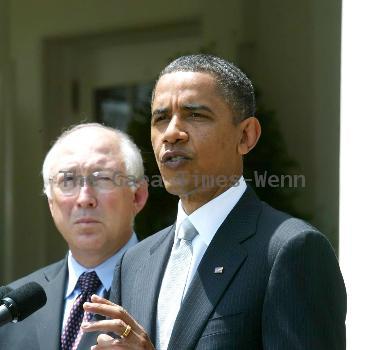A lifetime of playing it safe puts Kagan on undeviating path to front steps of high court
By Nancy Benac, APSaturday, June 26, 2010
Kagan’s life an undeviating course to high court
WASHINGTON — For all the ink devoted to Supreme Court nominee Elena Kagan lately, it may be her own words that best explain her success at charting an undeviating course to the front steps of the high court.
She’s excelled by dint of hard work, smarts and what she describes as good “situation sense” — the ability to size up her surroundings and figure out what truly matters, as she put it during confirmation hearings for her last job, as President Barack Obama’s solicitor general, the government’s top lawyer.
It’s what allowed Kagan to channel the thinking of legal giant Thurgood Marshall when she was a “27-year-old pipsqueak” clerk to the justice.
It’s what allowed Kagan to navigate through the land mines of government policy on abortion, tobacco and other contentious issues as an adviser to President Bill Clinton.
It’s what allowed Kagan to thrive as the first female dean of Harvard Law School and even foster detente within its famously fractious faculty.
Now, 50-year-old Elena Kagan stands before the Senate, confident she will be judged ready to join the justices whom she’s calls “fabulously smart, fabulously interesting people.”
The Senate Judiciary Committee begins hearings Monday on Kagan’s nomination. While Republicans have done plenty of grumbling about her liberal political views, all sides anticipate she will be confirmed before the Senate’s August recess as the court’s youngest justice.
Kagan, we’ve learned, has made it her life’s mission to be ready.
She posed in judicial robes in her high school yearbook. She considered her stint on a college newspaper good filler for a law school application. She once lamented the defeat of a Democratic Senate candidate whom she’d worked for by wondering aloud, “How will I get a job now?”
Asked what she was most proud of, Kagan last year told National Public Radio: “Working really, really hard, and achieving as much as I could.”
Kagan’s work has been her life. Groomed to achieve from her earliest years, Kagan’s made-to-order resume starts with Princeton, Oxford and Harvard. A clerkship under Marshall at the Supreme Court gives way to stints in private practice, teaching, the Clinton White House.
Kagan lived her life carefully and cleanly. Cleanly enough that in 1999 Clinton nominated her for a seat on the federal appeals court bench in Washington.
Then came a rare hiccup, not of Kagan’s own making: The Republican-controlled Senate never acted on her nomination. “Her” seat on the bench instead eventually went to future Chief Justice John Roberts.
Kagan didn’t let the setback slow her down. At Harvard, she quickly moved from visiting professor to full law professor to dean.
“Elena took the post at a time when I think most people thought that Harvard Law School was an unmanageable institution and did a remarkable job,” says Paul Clement, a former solicitor general for President George W. Bush and Kagan endorser. “It speaks to the quality of her ability to deal with people from across ideological divides and to manage a very difficult institution.”
Kagan won praise for recruiting prominent conservatives to join the liberal lions on Harvard’s faculty.
But her tenure there also has given her critics a rallying point. As dean, Kagan defended the school’s restrictions on military recruitment on campus because of the Pentagon’s prohibition on openly gay service members. She called the policy “a moral injustice of the first order.” Kagan also stressed that her disagreement with the military didn’t extend beyond that single issue.
Kagan never did become a judge, which critics see as a problematic gap in her experience. Sen. Jeff Sessions of Alabama, the top Republican on the Senate Judiciary Committee, sees in Kagan a “dangerous nominee” — young, with a thin legal record, a liberal bent and an affinity for activist judges.
But Justice Antonin Scalia, the high court’s most outspoken conservative, framed Kagan’s lack of judicial experience as an asset.
And Kagan got what might be the next-best thing: Obama chose her to be the first female solicitor general.
Over the past year, she’s argued the government’s side in six cases before the Supreme Court, a daunting setting for a novice litigator. Kagan held her own and displayed a remarkably easy, informal style in her back-and-forth with the justices, unafraid to challenge their assumptions and even make a stab at humor.
Kagan, who’s 5-foot-3, began one case by rather dramatically turning a crank to lower the wooden lectern in the Supreme Court chambers, advising the justices, “This may take some time.”
For all her hard work and focus, Kagan is no machine. She is wry and funny and thoughtful. And, on occasion, snarky and profane, too.
In the solicitor general’s office, Kagan made it a point to send a personal note and a bottle of champagne — a nice one — each time an assistant argued his or her first case before the Supreme Court.
Bruce Reed, Kagan’s boss during her years on Clinton’s domestic policy council, which dealt with a host of thorny issues, says Kagan was always “quick to laugh about herself and about the situations we found ourselves in.”
“Most really smart people aren’t fun to work with, but she is,” Reed said.
Kagan’s e-mails from the Clinton years include some blisteringly frank language — some of it directed at herself.
“I f—ed up,” she wrote in one.
“Don’t volunteer us for s—work,” she wrote in another.
Kagan also has a temper, and isn’t afraid to show it.
Harvard law professor Charles Fried, a Republican who supports Kagan’s nomination, says she once blew up at him during a disagreement concerning what to do about pages missing from a constitutional law exam.
“She screamed and shouted at me and slammed the door and stormed out,” Fried recalled. “Two minutes later, she came back and said, ‘I’m sorry I shouted.’ I said, ‘Elena, don’t apologize, you were right.’”
Kagan, who is single, hasn’t made much of a splash in Washington’s social scene. Early whispers raising questions about her personal life were quickly squelched by the White House. Her parents — a school teacher and activist lawyer in Manhattan — both are deceased. Her two brothers declined to say much about the family, although one brother, Irving, does allow that the siblings “have been known to talk about pie preferences” at Thanksgiving dinner.
“But she’s never asked us to help her with her thinking about the law,” he said in an e-mail.
While Kagan is known for keeping her legal opinions to herself, documents from her days in the Clinton administration show she wasn’t afraid to be a strong advocate for her positions in private.
She scrawled “yuck,” on a document about race. A memo on welfare policy got the same treatment three times over: “yuck, yuck, yuck.”
“Oh please — one-sided,” she wrote on tobacco memo.
Kagan also has been a harsh critic of her own words, when expedient.
When questions arose last year about a 1987 memo she wrote about government funding for religious organizations, she called it “the dumbest thing I ever heard.”
She’s also backpedaled from a 1995 article in which she wrote that senators should draw out Supreme Court nominees’ opinions on important legal questions.
Asked about that last year, Kagan allowed that some questions “cannot be answered consistently with the responsible performance of the job the nominee hopes to undertake.”
So Kagan comes into her Senate hearings with a slim legal record and a history of playing it safe in her public comments. That could ease her path to confirmation. But it begs another question: With a lifetime appointment and the freedom to speak her mind, will she remember how to do it?
Teresa Wynn Roseborough, who clerked in 1987-88 for now-retiring Justice John Paul Stevens when Kagan was in her 20s and working for Marshall, says Kagan was part of a group of clerks that played basketball every week on the top floor of the Supreme Court building. One time, when Roseborough made a comment during the game about something unrelated to basketball, she said, Kagan “quickly admonished me to get my head back into the game, and that’s kind of how I saw her as a clerk.”
As a justice on the court, Roseborough said, “If somebody loses focus, she’ll get them back in the game.”
Associated Press writers Beth Harpaz in New York, Julie Hirschfeld Davis and Mark Sherman in Washington and Denise Lavoie in Boston contributed to this report.
Tags: Barack Obama, District Of Columbia, Higher Education, Judicial Appointments And Nominations, Law Schools, Legislature Hearings, North America, United States, Washington



